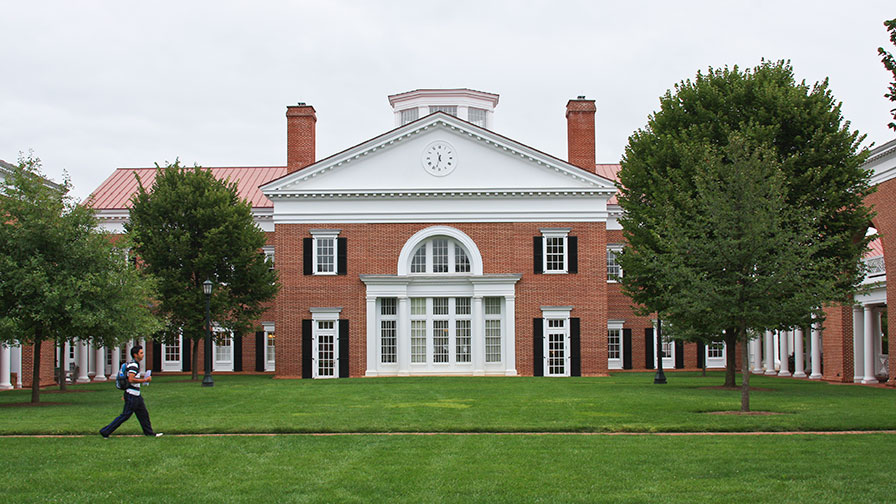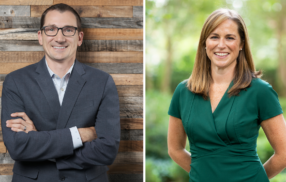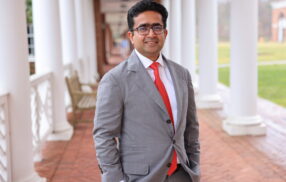
The Power and Promise of Online Learning
By Dave Hendrick
Professor Jared Harris stands in front of a giant green screen, takes one more glance at his notes, looks into the camera and nods.
From the studio control room, producer Kyle Niehoff is readying to capture one of the final sections on Harris’ forthcoming massive open online course (MOOC) on strategy.
“Ok, good energy. Smiles. Take it away,” Niehoff says, as he hits record.
Harris walks his future students, who will join him from all parts of the globe, through an acquisition analysis, what he terms “one more tool in your toolkit that can be extremely valuable when you consider acquisition as a growth strategy.”
After roughly five minutes of nailing his talking points, Harris decides to run through the material again to streamline the message and shave off a valuable minute or so.
The class will soon be posted online. From there, an aspiring Russian MBA student like Zhdan Shakirov (Class of 2017), a young mother in Sri Lanka like Dilrukshi Gamage, or anyone with an Internet connection will have the opportunity to engage with a highly regarded professor at the University of Virginia Darden School of Business.
Education wasn’t always like this.
From Moscow to Charlottesville
Shakirov was working as the head of the economic and planning office at an elite university in Moscow, engaged in a strategic review of various core processes in higher education, when he decided to further pursue his own education via an MBA at a top university in the U.S.
While researching the best place for his further study, Shakirov came across a school whose name he had never heard: Darden.
Intrigued by what he read on the Darden website, Shakirov decided to take the “Foundations of Business Strategy” MOOC taught by Professor Mike Lenox. The appeal was immediate, he said.
“I thought, if these guys could create something very interesting and of that quality, and deliver it online in a very good way and do it for free, then my hypothesis was that on Grounds they could do something even more interesting,” said Shakirov, who also connected with several Darden alumni to help inform his decision.
Shakirov enrolled in the School, and is pursuing a dual-degree MBA/M.Ed. program with UVA’s Curry School of Education.
In the U.S. for just a few months, Shakirov said he could not be more pleased with his decision, one he owes in large part to a well-constructed online course that a professor recorded in the Darden studios some months prior.
“It’s very hard to understand from the outside perspective, but the MOOC helped me,” said Shakirov. “It was the kickoff that helped me learn more.”
Brave New World
In certain ways, the classroom experience at Darden remains much as it has for 60 years.
At its core, top faculty lead top students through case studies and experiential learning that convey the skills and knowledge needed to excel as a responsible business leader on the global stage.
It is a system imprinted on the School’s soul, and one to which Darden leaders, faculty and students remain fiercely committed.
But in critical ways over the last few years, the Darden of today has adapted to a changing 21st century model of education, and continues to position itself to best engage in the business conversation of the future.
Perhaps nowhere is the embrace of what’s next more evident than in the growth of online learning. Through its MOOCs, Executive Education offerings, custom courses for organizations like Anheuser-Busch InBev, and distance learning courses in the MBA for Executives and Global MBA for Executives programs, Darden now produces a robust and growing array of online courses, each with specific purposes and audiences.
“By designing learning experiences that range from MOOCs to higher-touch, project-based courses, we’ve been able to see many new possibilities for extending our thought leadership around the world,” said Joanne Meier, Darden’s executive director of instructional design and assessment. “The feedback from our students and from our Executive Education clients has been overwhelmingly positive.”
The MOOCs, for instance, serve as something of a global welcome mat for the School, having introduced Darden thought leaders and concepts to people like Shakirov and more than a million others since the faculty first began exploring the platform in 2013.
Expanding Reach and Recognition
For the creator of the strategy MOOC, Shakirov’s story shows the platform working about as well as possible.
“When you think about that global reach, it can be very important for a school like Darden, which doesn’t necessarily have the global brand recognition of some of our peers,” said Lenox, who keeps a chess set as a gift from a group of Mongolian businessmen who took the course as a cohort.
While the MOOCs get the lion’s share of the attention and debate, the courses are just one outlet for online content that can be repurposed in countless ways.
“I think where we are, and where a lot of schools are, is trying to understand multiple ways we can leverage content that is created for the online environment,” said Lenox, who has written extensively about the power and promise of online education. “Current standards of very short, chunked content lend well to repackaging and pulling and mixing modules as needed for whatever learning program you’re in, be it a degree program, executive education or the MOOCs.”
While Darden is among many schools seeking to determine the best use for online education, Lenox said the School has a pair of built-in advantages. The first is the large, modern studio on Grounds, which allows for the production of high-quality videos in a nimble manner. The second is the approach to student interaction common among the Darden faculty, particularly an emphasis on excellent teaching.
“The types of skills that we nurture and select for among our faculty actually translates well to the online environment,” Lenox said. “We specialize in the case method in the Darden classroom, but those same beliefs and values and skills lend themselves to designing any kind of educational engagement.”
With over a million people enrolled in Darden MOOCs, not all students walk away from a course with a meaningful experience. Still, Darden professors continue to hear surprising and inspiring stories regarding the power of these enormous courses.
Dilrukshi, for instance, was home in Sri Lanka with a newborn daughter when she first discovered MOOCs.
Darden Professor Jeanne Liedtka’s “Design Thinking for Innovation” course, in particular, struck a chord, and Dilrukshi, a student at the University of Moratuwa in Sri Lanka, said she found the new concept of journey mapping a “great way to innovate.”
Dilrukshi said she used the concepts as she put together what she called an e-learning workshop in Sri Lanka, spreading the story of Darden MOOCs to students a world away from Charlottesville.
“MOOCs brought me fortune,” Dilrukshi said.
Her research now focuses on improving the effectiveness of e-learning. It is an area of research Darden, and much of the world of higher education, remains focused on, as well.
The University of Virginia Darden School of Business prepares responsible global leaders through unparalleled transformational learning experiences. Darden’s graduate degree programs (MBA, MSBA and Ph.D.) and Executive Education & Lifelong Learning programs offered by the Darden School Foundation set the stage for a lifetime of career advancement and impact. Darden’s top-ranked faculty, renowned for teaching excellence, inspires and shapes modern business leadership worldwide through research, thought leadership and business publishing. Darden has Grounds in Charlottesville, Virginia, and the Washington, D.C., area and a global community that includes 18,000 alumni in 90 countries. Darden was established in 1955 at the University of Virginia, a top public university founded by Thomas Jefferson in 1819 in Charlottesville, Virginia.
Press Contact
Molly Mitchell
Associate Director of Content Marketing and Social Media
Darden School of Business
University of Virginia
MitchellM@darden.virginia.edu





